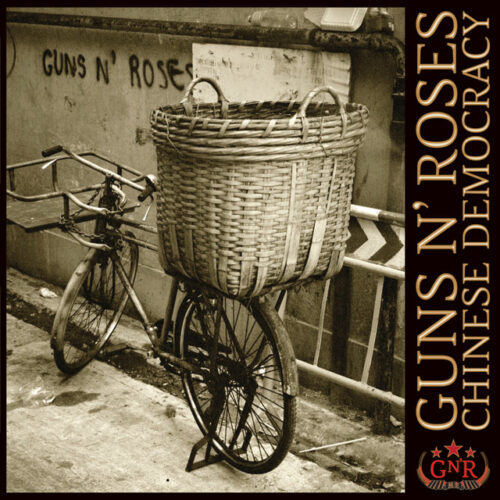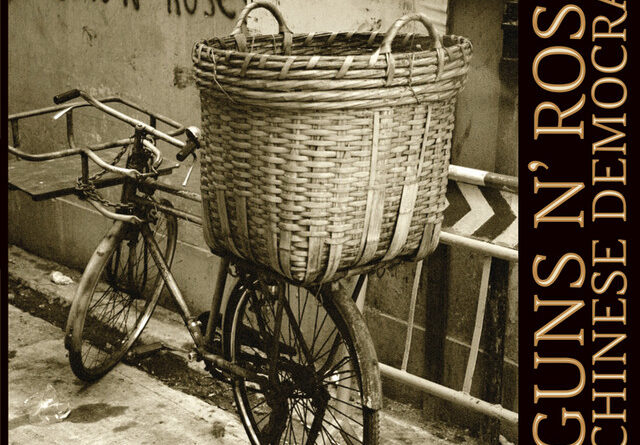HEAVY MUSIC HISTORY: Chinese Democracy – Guns N’ Roses
Chinese Democracy is a much-maligned chapter in the history of GUNS N’ ROSES that seems at odds with where the band are today. Murmurs regarding a core line-up reunion started in 2014 when the new line-up members started to disappear one-by-one, citing several reasons. The following Spring gave fans the first inkling that a core reunion might happen, with Slash appearing on CBS This Morning to talk about a completely separate topic – elephant conservation and the illegal ivory trade. Focusing on his fund-raising single Beneath The Savage Sun with Myles Kennedy, the topic of GUNS N’ ROSES eventually dragged itself out, as it often did in interviews with the ex-members. While such questioning didn’t always yield positive results, Slash gave a vague yet hopeful inclination about the possibility of such a reunion with the baiting phrase “Never say never”.
2023 finds a band largely reunited (sans-Steven Adler, who has only appeared sporadically since his 1990 firing) that have played several world tours since their 2016 “Not In This Lifetime…” tour, including a headline slot at this year’s Glastonbury Festival. Following the tumultuous time surrounding Chinese Democracy (2008), the band seem to be back in a full-time capacity and have even released snippets of new music along the way. It’s an exciting time for fans, but from the perspective of rock music history, there are fewer things more interesting than the period between the initial break-up and this reunion; a period where Chinese Democracy intrigued confused fans with its myriad of issues, including extensive delays, re-recordings, line-up changes, and stylistic differences to anything released under the GUNS N’ ROSES banner before or since.
Following a dwindling line-up in the mid-90’s, Axl Rose began auditions and fielded producers across varying musical styles to shift their style to something “more contemporary”. In ‘W.A.R.: The Unauthorised Biography of William Axl Rose’ by Mick Wall, Slash talked about Rose’s obsession with “the electronica of NINE INCH NAILS” and how Rose had planned to write a “dream team” record featuring Trent Reznor, Dave Navarro (JANE’S ADDICTION), and Dave Grohl (NIRVANA). Such plans ultimately fell through, but Rose’s fixations only grew. With the quick rise of nu-metal at the time, it’s clear to see why Rose was lured in this direction. Various rock and metal bands took similar steps – METALLICA, SLAYER, and MACHINE HEAD dabbled with nu-metal inspired sounds in the late 90’s/early 00’s, to mixed results. Even BRUCE SPRINGSTEEN AND THE E STREET BAND took some creative leaps with their use of programmed drums and hip-hop inspired beats on several tracks from 2002’s The Rising. The line-up changes and creative differences caused Duff McKagan to become frustrated, finally exiting in August 1997 and later venting his frustrations in his autobiography ‘It’s So Easy (And Other Lies)’. “Guns had been paying rent on studios for three years now—from 1994 to 1997—and still did not have a single song. The whole operation was so erratic that it didn’t seem to fit with my hopes for parenthood, for stability”. Rose became the only core member left, and what followed was several years of frequent arrivals and departures, rumours, speculation, and a developing belief that a new album may be dead in the water.
In November 1999, nine years before the album would eventually surface, Rose prematurely announced the title Chinese Democracy to Kurt Loder of MTV News. Rose also spoke about their first new track in eight years, the industrial metal inspired Oh My God, featuring in the 1999 film End Of Days. As Rose hinted, this track differed starkly from previous material, explaining that he had become quite interested in WHITE ZOMBIE and nu-metal acts such as LIMP BIZKIT that shared the soundtrack with them.
Oh My God doesn’t feature on Chinese Democracy, and it ultimately feels drastically different to finished product. Indeed, much of what the band wrote and recorded over the years didn’t appear – in February 1998, GUNS N’ ROSES manager Doug Goldstein stated that they had recorded “more than 300 hours’ worth of material” – but some of what they recorded during this time was set aside and reworked. All it takes is a glance at the personnel section in the liner notes of this album to understand that Chinese Democracy, though much delayed and hampered by stability issues, is the result of this hectic process.
A wealth of information regarding the production and release of this album exists, and it has become a notorious example of a piece of media that seemed to be stuck in “Developmental Hell”, releasing more than a decade since the initial work arguably began. In early 2008, the soft-drink brand Dr. Pepper goaded GUNS N’ ROSES, saying that they would offer a free can to everyone in the US (excluding SLASH and BUCKETHEAD) if Chinese Democracy released that year. This so happened to match Rose’s actual ambitions for the album, and when it was announced that they would in fact release the album in 2008, the brand tried and failed to make good on their promise. What resulted from this farce was a lawsuit, several full-page apologies appearing from Dr .Pepper in US newspapers, and a confused Axl Rose telling his lawyers that they should instead have been “focused on the record release”.
Chinese Democracy was finally released in November 2008, and 2023 marks the fifteenth anniversary of it’s release. This extensive, electronic-inspired rock album featured 71 minutes of new material from the band. The album had more than twelve musical contributors on tape by the time the final sessions were recorded, but most prominently featured were Bumblefoot, Buckethead and Robin Finck on guitar duties, Frank Ferrer and Brain on drums (with arrangements from Josh Freese), Tommy Stinson on bass, and both Dizzy Reid and Chris Pitman contributing keyboards. Critical reception was mixed – any album surrounded by such turmoil and attention for over a decade couldn’t possibly live up to the unrealistic expectations. The album itself is an interesting, if bloated, listening experience, featuring some genuinely interesting highs compounded by cringe-worthy low moments. The opening run of 7 tracks, ending with the massive Catcher In The Rye, could be a short album in itself. Following from that, the over-produced and eye-rolling harmonies on Scraped signal where Chinese Democracy begins to fall apart. There are other highlights – Riad N’ The Bedouins is very classically GNR, and there is some fantastic musicianship on display on the latter half, but many of these tracks pale in comparison to the brilliant Better, the exceptional guitar work on There Was A Time, and the stand-out title track. Even the somewhat misguided Shackler’s Revenge, which takes on board a lot of the nu-metal influence, is an earworm that many might see as a guilty pleasure.
The legacy of Chinese Democracy will, somewhat unfairly, always be its massive delays, expensive production, and comparatively inferior final product. If considered as an Axl Rose solo-project, it may have a different contemporary opinion. It’s understandable why Rose decided to use the GUNS N’ ROSES name, and it’s meant that the band still occasionally play tracks live, but the fervour of the fan base and media created an unrewarded anticipation that has likely sealed its place in history.

Chinese Democracy was originally released on November 23 2008 via Black Frog/Geffen Records.
Like GUNS N’ ROSES on Facebook.

